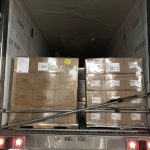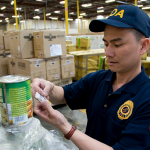Archive for the ‘Liability’ Category


Proper Transport of Fresh Produce: Sanitation
Posted on March 22nd, 2019Proper transport of fresh produce from farm to market reduces the potential for microbial contamination. Within the transportation chain, it is the responsibility of all parties involved to communicate and maintain the quality and safety of the produce while in transit. Cross-Contamination Every time a product gets moved, there is […]


Mixing Produce in Reefer LTL: Factors to Consider
Posted on February 21st, 2019What else needs to be considered in transporting product other than proper temperature management? A major factor to consider is having a truck with a mixed load of produce that affect each others aromas and flavors. The perfect storm is brewing if the carrier is unaware of the nuances of […]


Maintaining Proper Transit Temperatures: Produce
Posted on February 1st, 2019Shelf life, shelf life, shelf life! Produce has an interesting mix of factors to consider before mapping out a truck, especially if there will be different types of produce in the same load. Even though transportation takes only a few days of shelf life of produce that could be a […]


The Refrigerated (Reefer) LTL Shipment: What it Takes
Posted on January 24th, 2019Temperature Controlled reefer LTL shipments are a little more complex than regular dry LTL shipments due to the sensitivity of the freight for temperature and transit time requirements. What Are Refrigerated LTL Shipments? A refrigerated LTL shipment is a less than truckload (LTL) of goods that need to be […]


What is Reefer Trucking?
Posted on January 4th, 2019Reefer trucking, also known as “refrigerator” trucking, is a freight shipping method, specializing in the transportation of foods and products that require temperature-control during transit. The trailer has a built-in refrigeration system to keep all products in the same state that they were received in, whether it be cooled, […]


Country of Origin Labeling Requirements
Posted on October 19th, 2018Imported products are required to be marked with their country of origin. Countries of origin are where products were manufactured, produced or grown. This is necessary as a Customs requirement to keep the process efficient, since it makes it obvious if a good can legally be imported. It also provides […]


How Hurricanes Affect Your Freight
Posted on October 10th, 2018With today’s sophisticated technologies to better anticipate storms and hurricanes, we are better prepared than ever to handle this type of natural disaster. Since we have some predictability, organizations can plan ahead to send extra essentials and supplies to hold over until the storm passes. Photo: October […]


Why do I need Cargo Insurance?
Posted on October 5th, 2018Doesn’t the carrier have to pay for the value of the goods if something happens? One would think this is normal, but oftentimes it is difficult to pinpoint where something went wrong. Freight claims are often denied by carrier. If something happens while your cargo is in transit, there is a chance […]


The Purpose of the Bill of Lading
Posted on September 21st, 2018The purpose of Bill of Lading (B/L) is to outline the journey of your cargo from the origin to the destination. This is issued by a carrier to a shipper to detail the method and path of a shipment, and is used as a contract for the movement of the cargo. […]


Importing Food into the U.S. and FDA Clearance
Posted on August 31st, 2018Planning to import food to the United States of America? Here are some basic steps to get started! 1. Register with the U.S. Food and Drug Administration (FDA) You will need to register with the FDA before importing your food shipment. Importers and food facilities in the relevant exporting countries […]
